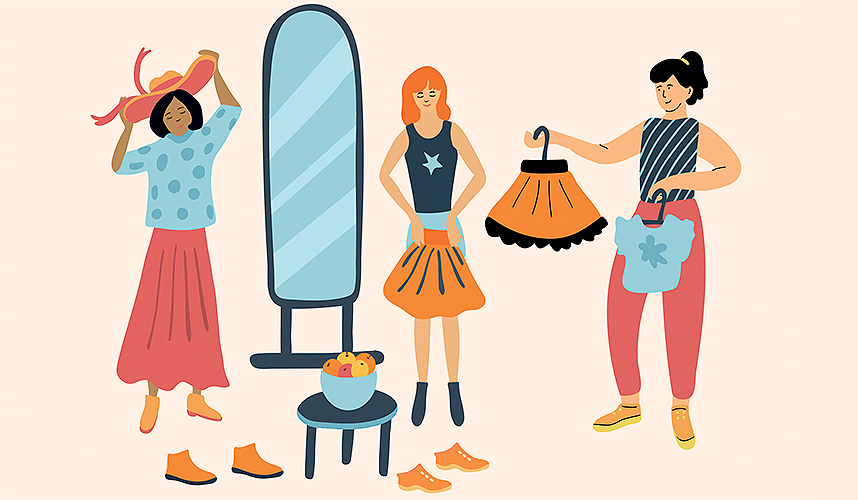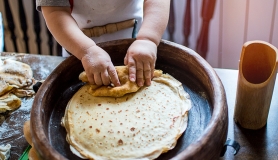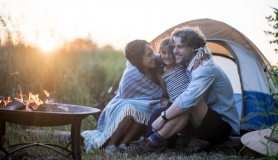Here are some ways to get you started. There are so many methods of sharing, and diverse forms of the following ideas exist around the world. Can you create your own spin on them and introduce some of these ideas in your communities?
- Host a clothing share. Have people bring any clothes they’re done with and lay them all out on a table. You can separate them by kind or just let people look through the piles. It’s fun to do it in someone’s home, or try it on a dry sunny day in a public park. You’ll be impressed with all the cool new togs you’ll come home with. Some groups have a point person who then takes all of the clothing that is left over and turns it into a round-robin for those who missed the event (see #3).
- Start a meal club. Get a group of culinary minded friends together and start a meal club. This takes batch cooking to a new level and varies your meals while you use only one recipe in your own kitchen. So, if there are five of you, then you make five lasagnas, for example, and get four other homemade meals in return for your family! If people in your group have freezer space, it’s great to do this monthly and choose foods that freeze well. Everyone cooks on the same day (Sunday seems to be the most popular choice), then meets up to swap finished food all at once. It can also be done with fresh foods. Just assign a day to each person for their bulk cooking. Who doesn’t want a break from cooking some nights?
- Launch a round-robin. Round-robins are a collection of items that you send into your community for people to pass around, take what they want, and add to. We often create a collection for specific sizes of children’s clothing, for example. But round-robins can be created for women’s and men’s clothing, makeup, kitchen supplies, and toys.
- Create a garden share group. When Liesl first moved to Bainbridge Island, she started a group called Island Garden Share, where she invited people to come to her house once a month and bring with them perennials, cuttings, and veggie starts from their gardens to share with the group. Each participant would go home with new plants and veggies to put in their gardens. It was a garden plant potluck of sorts and saved everyone so much money in starting new perennial beds. Another added benefit? It was the best way to meet others who shared a passion for growing perennials and vegetables.
- Go gleaning. When it’s harvest time, find apple trees, blackberry bushes, grapevines, pear trees, any fruits or vegetables growing on public land that would otherwise go to waste, pick the produce, and share it with everyone.
- Create a “Buy Nothing, Share Freely Holiday Shop.” We’ve run a free Christmas shop for years, a party where people bring items that are gift-worthy and both children and adults can take any item they’d like to give to family members and friends. Everyone goes home with armloads of gifts for the holidays.
- Build a Little Free Library. Little Free Libraries have been a thing for years and they’re such a cool gift to give the world. Build a little weatherproof box that can hold books, and put it out at the end of your driveway or other safe location accessible to your neighbors (apartment lobbies are perfect, with permission from your building manager). People will come and take what they like and add to the collection. Visit littlefreelibrary.org for all of the details, including building plans and a global map of Little Free Libraries.
- Start a library of things. Lending libraries are not only for books! We’ve seen libraries for tools, seeds, housewares, and fancy clothes, all started up as innovative local re-sources for neighbours to share. Choose an item or items you’d like to steward, like cloth napkins for events (this saves so much on paper waste), metal cutlery, wineglasses, plates, camping gear, snowshoes, carpet steamer, etc., and your neighbours will thank you. Choose the item you’d like to loan to people, let everyone know, and be the go-to person for that much-needed thing.
- Create a fleet of “free bikes” and set them free for people to ride from place to place. We did it, and spray-painted the bikes with a “ride me” sign on them.
- Start a Fix-It Fair. These are so essential! Assembling local engineers, electricians, carpenters, seamstresses, and MacGyvers for a Fix-It Fair can go a long way to prevent things from going into the landfill. You may already have one nearby, so just type “Repair Café” or “Fix-it Fair + [your county or region]” into your browser and see what pops up.
- Start a monthly “Really Really Free Market.” Minneapolis has a successful free market that has benefited many families. You could start one in your city or town, too. Minneapolis’s Market is very popular. People contribute what they no longer need and pick up what they do. Here’s what they put out in the local newspaper to spread the word: “Everything here is FREE: offer what you’d like to give and take what you would like to receive. Food, music, and company are as welcome as objects. Please treat everything as a gift, and please take back with you any things that you have brought that nobody has taken.”
- Garden communally and share produce. If you have growing space, turn it into a neighbourhood garden. Sharing the land and work will increase yields, bringing food and joy to more people. You can also contribute your excess produce to a Grow Free cart, a beautiful movement of colourful carts started in Australia where people share their excess produce and take what they need from the carts. Why not start a cart for your community? This idea from Down Under deserves to take root around the world.
MORE INSPIRATION
READ The Buy Nothing, Get Everything Plan by Liesl Clark and Rebecca Rockefeller
EXPLORE Start your own Buy Nothing group in your neighbourhood with guidancefrom buynothingproject.org







